New Report Highlights Critical Areas Of Investment For Government’s ‘Dementia Moonshot’
Alzheimer’s Research UK has launched an ambitious spending plan for the government’s ‘Dementia Moonshot’ funding pledge – with the charity outlining six priority research areas that must receive investment, if we are to find a life-changing treatment.
Following the Conservatives’ election promise to double government funding for dementia research to over £160 million a year, the charity’s report, ‘Delivering the Dementia Moonshot’, identifies the most ambitious and promising research avenues, and gaps in knowledge, where urgent investment is needed.
The UK’s leading dementia research charity is calling on the government to:
- Invest £20 million over five years into a global early detection initiative, which will help to detect the diseases that cause dementia 10-15 years earlier. This will help people understand and reduce their risk of developing the condition, most commonly caused by Alzheimer’s, and will mean potential treatments would be tested at an earlier stage when they may have more chance of success.
- Establish a ‘Dementia Translational Medicines Accelerator’, a fund dedicated to testing the promise of drugs in very early clinical trials for dementia, which will help us to better predict whether emerging medicines will be successful at later stages of clinical trials. This would need £50 million over five years from government, with additional funding leveraged from industry.
- Make the UK the best place to carry out clinical dementia research, with an investment of £260 million over five years. This would include recruiting a group of ‘trial ready’ volunteers ready to take part in research; boosting the research capacity of memory clinics; and expanding a network of ‘Brain Health’ clinics across the country to offer improved opportunities to take part in research and trials.
Other priority areas include building the current research infrastructure to maintain the UK’s position as a global leader in dementia research, greater investment in dementia risk reduction and prevention, along with developing robust prevalence data to better understand the scale and impact of dementia across society.
Dementia is the biggest healthcare crisis of our time and the nation’s biggest killer. By 2021, over one million people in the UK will be living with dementia, and the condition will cost the UK economy a staggering £30bn each year.
Despite this, dementia treatment and research lags far behind other serious diseases, such as cancer and HIV/AIDs. That’s why Alzheimer’s Research UK is asking the government to ensure dementia is a key priority in future health research and drug treatment discussions.
Dr Helen Beaumont, a dementia researcher and an Alzheimer’s Research UK Champion, said:
“My husband Clive was diagnosed with frontotemporal dementia aged just 46 and died aged 51. We struggled for years to get a diagnosis – for a long time, doctors refused to acknowledge that a healthy man in his early 40s could have dementia. When we finally did get a diagnosis, there was no treatment that could help him. The money pledged by the government will make a huge difference and, in the future, spare families like mine from the distress, difficulty and heartbreak we experienced. This investment cannot come soon enough.”
Ian Wilson, Chief Executive of Alzheimer’s Research UK, said:
“Now is the time to deliver political leadership that enables and capitalises upon breakthroughs that are on the horizon to transform the lives of people with dementia and their families. The recommendations in our report are ambitious, but it’s a level of ambition that is needed if we are to bring about a life-changing treatment for dementia. Government must recognise that dementia is our greatest health challenge, deliver on its manifesto promise and invest in the most promising and innovative research areas – there’s no time to lose.
“For too long dementia has been causing devastation to those affected and their families across the UK. After nearly two decades without new treatments for dementia, we are beginning to see new promising developments. Without effective ways to prevent or treat dementia, one in three people born today will develop the condition in their lifetime. We must stop that from becoming a reality.”






